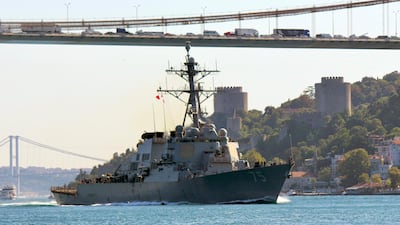Donald Trump concluded his national security meeting on Syria without reaching a decision on the type of response his administration may take, the White House said.
On Thursday afternoon, Mr Trump held extensive talks on Syria in a meeting that included his defense secretary James Mattis, joint chief of staffs Joseph Dunford, director of national intelligence Daniel Coates, ambassador to the UN Nikki Haley, new national security adviser John Bolton and others. The meeting was expected to go over military options and see Mr Trump make a decision on the type of response to the reported chemical weapons attack last Saturday in Douma.
But after the meeting the White House said the US president has not yet made a “final decision” on its Syria response. Reports surfaced that the lack of resolution was due to a rift between two camps in the Trump team. The first represented by the more hawkish side with the US president and Mr Bolton, and the second with the generals around Mr Mattis and Mr Dunford.
“There remains tension between what President Trump and National Security Adviser Bolton want and what the Pentagon is advocating”, Kate Brannen from Just Security reported:
The National has learned that prior to the White House meeting, US military leaders met late on Wednesday at the Pentagon and finalised a package of strikes options for the US president but that none of these options would debilitate the Assad regime airpower.
The cautious approach of the US military cadre is driven by concerns of retaliation from Russia if the US hit the Assad regime too hard or of it getting dragged into Syria’s civil war.
At the White House, the options presented fell short of the president’s expectations, and the Pentagon is expected to present an expanded list to the president on Friday.
NBC reported that Mr Mattis cancelled a trip to New York on Thursday night to continue to work on the Syria response.
Shortly after the meeting, Mr Trump called UK prime minister Theresa May and French president Emmanuel Macron. According to a statement by Downing Street, the two leaders “agreed that the Assad regime had established a pattern of dangerous behaviour in relation to the use of chemical weapons.”
It added that it was “vital that the use of chemical weapons did not go unchallenged, and on the need to deter the further use of chemical weapons by the Assad regime” and that both agreed to “keep working closely together on the international response.”
On Thursday, Mrs May gained cabinet approval for an “international response” in Syria and Mr Macron said his government has proof that the Assad regime used chemical weapons in Douma.
Downing Street confirmed late on Thursday that the ministers have agreed with Ms. May “on the need to take action and deter the further use of chemical weapons.”
US officials told NBC and CNN that the Washington now “has blood and urine samples” from the reported chemical weapons attack that suggest “the presence of both chlorine gas and an unnamed nerve agent,” two officials said. The officials added they were “confident” in the intelligence, though not 100 percent sure.
US officials also told NBC that “they have evidence from countries, including images, that indicate the Syrian government was behind [the attack].”
French president Emmanuel Macron said in an interview with TF1 that “we have proof that last week chemical weapons, at least chlorine, were used by the regime of Bashar Al Assad.”
In another clear signal at military planning, CNBC reported that the US “was considering striking eight potential targets. Those targets include two Syrian airfields, a research centre and a chemical weapons facility.”
The US confirmed on Thursday that the Assad regime was moving air assets to Russian airbases to avoid strikes. According to Reuters, Russia confirmed that a crisis communications link with the United States, created to avoid an accidental clash over Syria, was still open.
At Congress, Mr Mattis told lawmakers that the administration will notify the lawmakers ahead of any operation, without, however, seeking their approval.
At another hearing, General Mark Milley, the US Army’s chief of staff, agreed with Mr Trump that Assad should pay a big price. “Absolutely, yes. No question he should,” general Milley said arguing to degrade his ability to use chemical munitions.
Aaron Stein, a senior resident fellow at the Atlantic Council’s Rafik Hariri center for the Middle East, told The National that “it appears, based on the latest reporting and leaks, that it will be a limited strike aimed at sending a message about chemical weapons use.”
He added that if the leaked targets and scope is accurate, then “it is unlikely that it will make much of a difference, in terms of the direction of the conflict and, importantly, in the Assad regime efforts to reconstitute his chemical weapons program.”
Mr Trump told reporters on Thursday he will make his decision “fairly soon.”


